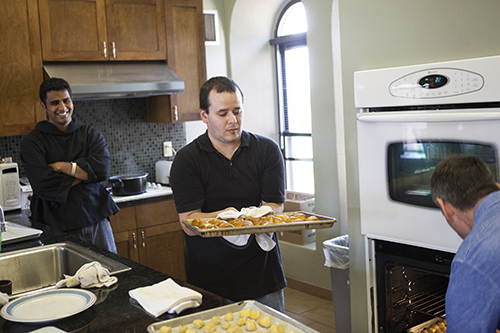
Listen to Our Podcast
Echoes from the Bell Tower, a podcast devoted to stories of wit and wisdom from the monks of Saint Meinrad.
True Service
By: Fr. Adrian Burke, OSB
Thursday, May 16, 2019

"The brothers should serve one another."
Rule of St. Benedict 35.1
By serving in the kitchen, refectory (dining room), church, or anywhere else, we express what Benedict calls "mutual obedience" by striving to address the needs of the community and thus solidify our mutual bond of fellowship.
Human "neediness" is rooted in vulnerability because we all need food and shelter to survive, but we also have a need for emotional connection, spiritual meaning, and acceptance, or a sense of belonging, that enables a person to feel safe.
By working to serve one another in these basic ways, we establish a home - a web of relationships whereby we all belong together. Families do this all the time - it's what makes people a family, as Jesus himself taught.
God's abundant care for us is often expressed through human modes of response. The Holy Spirit gives us a capacity to perceive, to acknowledge, and to respond to the needs of our neighbor through self-forgetting love (charity). God's grace moves in and through us (and as us!), reaching out in selfless charity to respond to the needs of another.
St. Benedict acknowledges this in RB 35 on kitchen service, when he writes that the monk ought to invoke God's assistance (grace) when beginning his assigned week of service by reciting the same thing the community chants when beginning its worship in the church: "God, come to my assistance; Lord, make hast to help me" (Psalm 69:2).
I include worship in the list of values that converge in the virtue of service because Benedict seems to say as much, as did the Apostle James when he wrote in his epistle that "religion (worship) that is pure and undefiled before the Father" consists of caring for those in need (James 1:26-27). If we remain uncaring or selfish, "we deceive our hearts and our religion is useless."
True service entails selfless love, which is precisely what being "like God" is all about. So serving one another is a vital component of what it means to be a monk according to the Rule of St. Benedict. "No one will be excused from service unless sick, or engaged (under obedience) in some other important business of the monastery" (RB 35.1).
Service of one another in love connects us to Christ, and that connection is the basis for any "merit" (reward) that we may receive in recompense from God. But more simply put, monks serve because it "fosters love" (RB 35.2), and nothing is more Godly than genuine love!